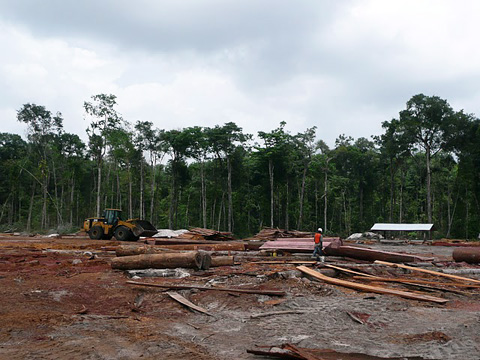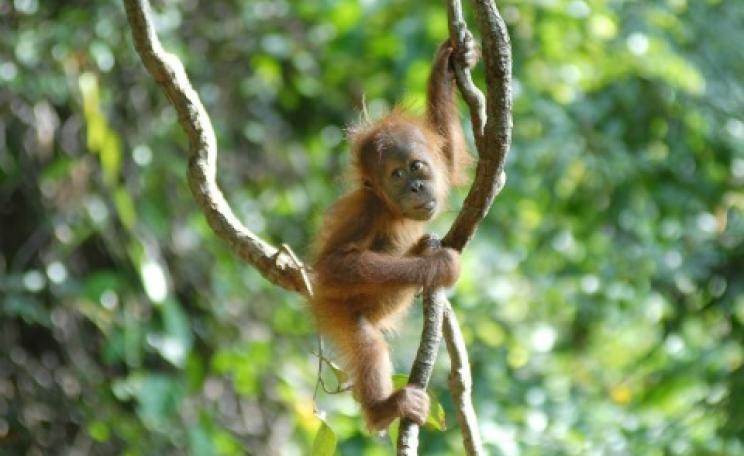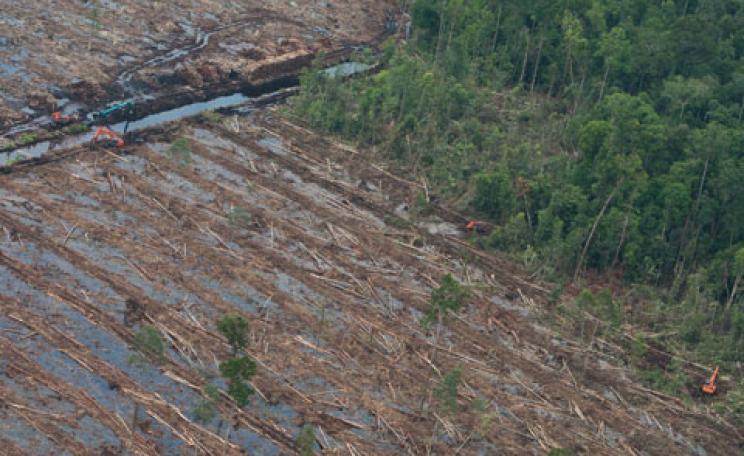For a decade, the threatened ramin tree species has been protected under Indonesian law, as well as the Convention on International Trade of Endangered Species, that was also designed to stop the ivory trade. However, Greenpeace's undercover filming of 2011 has revealed, the group says, that APP continues to log ramin trees in Indonesia, selling them to major global companies like Xerox, Walmart, Mondi, Countdown, Danone, Collins, Debden, Acer, Parragon, Barnes & Noble, and Constable & Robinson.
 As part of Greenpeace's investigation, samples from ramin logs found at APP's mill were sent to an internationally recognised expert in the area to confirm the samples were of the ramin species. Dr. Gerald Koch from the Institute of Wood Technology and Wood Biology, University of Hamburg, was able to do so effectively - and thus confirm APP's activities, Greenpeace say.
As part of Greenpeace's investigation, samples from ramin logs found at APP's mill were sent to an internationally recognised expert in the area to confirm the samples were of the ramin species. Dr. Gerald Koch from the Institute of Wood Technology and Wood Biology, University of Hamburg, was able to do so effectively - and thus confirm APP's activities, Greenpeace say.
The ramin trees aren't the only endangered species at risk because of APP's activities. Indonesia's ramin trees grow in the peatland swamp forests, habitat of the endangered Sumatran tigers. According to Greenpeace, APP have cleared areas of peatland swamp forest that are twice the size of New York city since 2001. The effect of logging in this area on tigers has been devastating campaigners say, with only 400 left in the wild.
APP denies the allegations. The company said in a statement to the Guardian: 'Asia Pulp & Paper group (APP) maintains a strict zero-tolerance policy for illegal wood entering the supply chain and has comprehensive chain of custody systems to ensure that only legal wood enters its pulp mill operations. APP's chain of custody systems are independently audited on a periodic basis. This ensures that we only receive legal pulpwood from areas under legal license that have passed all necessary ecological and social assessments.
'APP's chain of custody system traces the origin of raw material, evaluates its legal and environmental status, to minimise the risk of contamination and to ensure that endangered species are protected – in accordance with the laws of Indonesia.'
 TAKE ACTION: Asia Pulp and Paper aims to be the number one pulp and paper company in the world. But campaigners say can we allow them to keep a title they haven't earned?
TAKE ACTION: Asia Pulp and Paper aims to be the number one pulp and paper company in the world. But campaigners say can we allow them to keep a title they haven't earned?
Visit Greenpeace's website to write to the CEOs of the major companies involved with APP and urge them to terminate their contracts with the pulp and paper company until their dubious activities in Indonesia's peatland swamp forests come to an end.
| READ MORE... | |
 |
COMMENT Greenpeace: Asia Pulp and Paper's PR is greenwash, their sustainability claims a joke Tesco, Adidas and others have already cut ties with the controversial paper and packaging supplier. In a scathing response to recent APP claims that it is greening itself, Ian Duff urges others to follow suit - until APP adopts sustainable practices |
 |
NEWS Palm oil firms letting four-year-olds sign contracts 'Chaotic' legislation in Indonesia is allowing palm oil plantation companies looking to produce biofuel to bully local people off their land |
 |
NEWS Logging company accused of ‘misleading public’ with carbon conservation project Controversial Indonesian company Asia Pulp & Paper has come under fire from environmentalists because of 'false claims' over Sumatran rainforest carbon reserve |
 |
COMMENT Asia Pulp and Paper: why activists are wrong over destructive logging allegations The paper giant has been accused by Greenpeace of destructive logging and green-washing. But campaigners are mistaken, says APP boss Aida Greenbury - the company is supporting REDD projects and putting sustainability at the centre of operations |
 |
NEWS Norway accused of 'hypocrisy' over ethical investment The Norwegian government has sold its investment in one Malaysian logging and palm oil company but remains a big shareholder in another accused of destroying rainforest and orang-utan habitats |








